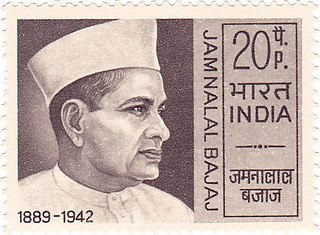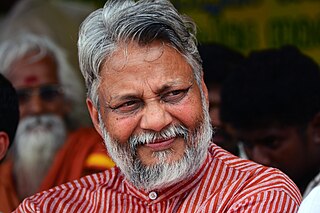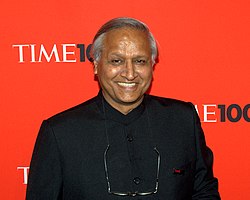
Murlidhar Devidas Amte, popularly known as Baba Amte, was an Indian social worker and social activist known particularly for his work for the rehabilitation and empowerment of people suffering from leprosy. He has received numerous awards and prizes including the Padma Vibhushan, the Dr. Ambedkar International Award, the Gandhi Peace Prize, the Ramon Magsaysay Award, the Templeton Prize and the Jamnalal Bajaj Award. He is also known as the modern Gandhi of India.

Jamnalal Kaniram Bajaj was an Indian businessman and politician. He founded the Bajaj Group of companies in the 1920s, and the group now has 24 companies, including six that are listed on the bourses. He was also a close and beloved associate of Mahatma Gandhi, who is known to have often declared that Jamnalal was his fifth son.

Rajendra Singh is an Indian water conservationist and environmentalist from Alwar district, Rajasthan in India. Also known as "waterman of India", he won the Magsaysay Award in 2001 and Stockholm Water Prize in 2015. He runs an NGO called 'Tarun Bharat Sangh' (TBS), which was founded in 1975. The NGO based in village hori-Bhikampura in Thanagazi tehsil, near Sariska Tiger Reserve, has been instrumental in fighting the slow bureaucracy, mining lobby and has helped villagers take charge of water management in their semi-arid area as it lies close to Thar Desert, through the use of johad, rainwater storage tanks, check dams and other time-tested as well as path-breaking techniques. Starting from a single village in 1985, over the years TBS helped build over 8,600 johads and other water conservation structures to collect rainwater for the dry seasons, has brought water back to over 1,000 villages and revived five rivers in Rajasthan, Arvari, Ruparel, Sarsa, Bhagani and Jahajwali. He is one of the members of the National Ganga River Basin Authority (NGRBA) which was set up in 2009, by the Government of India as an empowered planning, financing, monitoring and coordinating authority for the Ganges (Ganga), in exercise of the powers conferred under the Environment (Protection) Act, 1986.
Barefoot College, previously known as the Social Work and Research Centre ("SWRC") is a voluntary organisation working in the fields of education, skill development, health, drinking water, women empowerment and electrification through solar power for the upliftment of rural people, which was founded by Bunker Roy in 1972. It is registered under Friends of Tilonia Inc.
Janaki Devi Bajaj was an Indian independence activist who was jailed for participating in Civil Disobedience Movement in 1932.

Anil K. Rajvanshi is an academic from India, and is the current director of the Nimbkar Agricultural Research Institute (NARI).

Bajaj Group is an Indian multinational conglomerate founded by Jamnalal Bajaj in Mumbai in 1926. The group comprises 40 companies and its flagship company Bajaj Auto is ranked as the world's fourth largest two- and three-wheeler manufacturer. The group has involvement in various industries that include automobiles, home appliances, lighting, iron and steel, insurance, travel and finance.
Ashoka Gupta was an Indian freedom fighter and social worker. She was the founder of Mahila Seva Samity, member of the All India Women's Conference and president of Indian Society for Sponsorship and Adoption. She took part in rescue and relief operation during the Noakhali genocide.

Anupam Mishra was an Indian Gandhian, author, journalist, environmentalist, TED speaker, and water conservationist who worked on promoting water conservation, water management and traditional rainwater harvesting techniques. He had been awarded the 1996 Indira Gandhi Paryavaran Puraskar (IGPP) award instituted by the Ministry of Environment and Forests, Government of India. He travelled to villages across several Indian states, especially Rajasthan, Madhya Pradesh, Maharashtra, and Uttar Pradesh, describing the value of time-tested systems of water harvesting. He advocated conservation of traditional water structures in India as well as abroad. He wrote books like Aaj Bhi Khare Hain Talaab and Rajasthan Ki Rajat Boondein, landmark works in the field of water conservation. An extensive interview with Mishra about the history and future of the Yamuna River occupies the last chapter of Rana Dasgupta's book Capital: The Eruption of Delhi.

Jamnalal Bajaj Award is an Indian award, for promoting Gandhian values, community service and social development. Established in 1978, by the Jamnalal Bajaj Foundation of Bajaj Group, it is given annually in four categories, and usually presented by the President, Vice president, Prime Minister of India or a leading figure. The foundation currently headed by Rahul Bajaj, was created in 1977, in the memory of group founder, philanthropist and a close associate of Mahatma Gandhi, Jamnalal Bajaj. The award ceremony takes place on his birth anniversary, 4 November.
Rafea: Solar Mama is a 2012 American documentary film, directed by Jehane Noujaim and Mona Eldaief. It follows Rafea, an illiterate Jordanian Bedouin as she follows her aspirations of lighting up her village by harnessing the power of solar energy by enrolling in the Barefoot College solar program in India.
Mitraniketan K. Viswanathan was an Indian social reformer, philanthropist, and environmentalist in Kerala, India. He founded Mitraniketan, a non governmental organization in Vellanadu, Thiruvananthapuram, in 1956.
Biswanath Pattnaik was an Indian Gandhian activist and social worker involved in the Sarvodaya and Bhoodan movements. He received the Jamnalal Bajaj Award in 2008 for his contributions to social, medical, and educational programmes in areas with significant tribal populations, particularly Kujendri and Baliguda in Odisha, India.
Gutta Muniratnam was an Indian social worker, a member of the National Planning Commission of India and the founder of Rashtriya Seva Samithi (RASS), a non governmental organization engaged in the social welfare activities in over 2500 socio-economically backward villages in the Rayalaseema region, spread across the present day states of Andhra Pradesh and Telangana. He was honored by the Government of India, in 2012, with the fourth highest Indian civilian award of Padma Shri.
Shalini Moghe was an Indian educationist, social worker and the founder of Kasturba Kanya School for tribal children and Bal Niketan Sangh, the first Montessori school in the state of Madhya Pradesh. She was the chairperson of the Bharatiya Grameen Mahila Sangh, Indore, a national level non governmental organization working for the welfare and education of the disabled, orphans, under privileged and the economically weaker sections of the society and was involved with other Indore-based educational institutions such as Prestige Public School and Pragya Girls School. A winner of the Jamnalal Bajaj Award in 1992, she was honoured by the Government of India in 1968, with the award of Padma Shri, the fourth highest Indian civilian award for her contributions to the society.
Thacheril Govindan Kutty Menon was an Indian social worker and environmentalist. His contributions are reported in the introduction of environmentally friendly irrigation and farming techniques under the aegis of Kasturbagram in Indore, Madhya Pradesh. He is known to have promoted bio-dynamic agriculture in India. He received the Jamnalal Bajaj Award in 1989. The Government of India awarded him the fourth highest civilian honour of the Padma Shri in 1991.

Rabindra Nath Upadhyay (1923–2010) was an Indian social worker, Gandhian and the founder of Tamulpur Anchalik Gramdan Sangha (TAGS), a non governmental organization working for the social development of the rural people in the Kumarikata village of Assam. He was a recipient of the 2003 Jamnalal Bajaj Award. The Government of India awarded him the fourth highest civilian award of the Padma Shri, in 2000, for his services to the society.

Dr. Anil Prakash Joshi is an environmentalist, green activist, and the founder of Himalayan Environmental Studies and Conservation Organization (HESCO), a Dehradun-based voluntary organization. His work majorly includes developing sustainable technologies that are ecology inclusive economy for ecosystem development. He has coined GEP, an ecological growth measure parallel to GDP. GEP has been accepted as a growth measure by the state of Uttarakhand on 5 June 2021. He was selected as the man of the year by Week Magazine in 2003. He is a recipient of the Jamnalal Bajaj Award and is an Ashoka Fellow. The Government of India awarded him the fourth highest civilian honour of the Padma Shri, in 2006, for his contributions to Indian society. He was also awarded Padma Bhushan, third highest civilian award in 2020 for environmental conservation in Uttarakhand. Dr. Joshi appeared in the Kaun Banega Crorepati, Karamveer episode aired on 25 December 2020.
Padmanabha Pillai Gopinathan Nair was an Indian social worker, Gandhian, independence activist, and the chairman of Mahatma Gandhi National Memorial Trust.
Solar Mamas is the affectionate name given to women from different countries who have had hands-on training as technicians on the solar programme at the Barefoot College based in India. These women, with little or no formal education or literacy, usually between 35 and 50 years old, with no young children, and coming from often impoverished rural areas, go on to assemble, install, repair and maintain solar panels and equipment in their previously non-electrified villages. The women gain a sustainable income by doing this and have a new role in their communities beyond that of wife and mother, having given them the benefits of a safe, sustainable source of lighting for work, education and family life.









